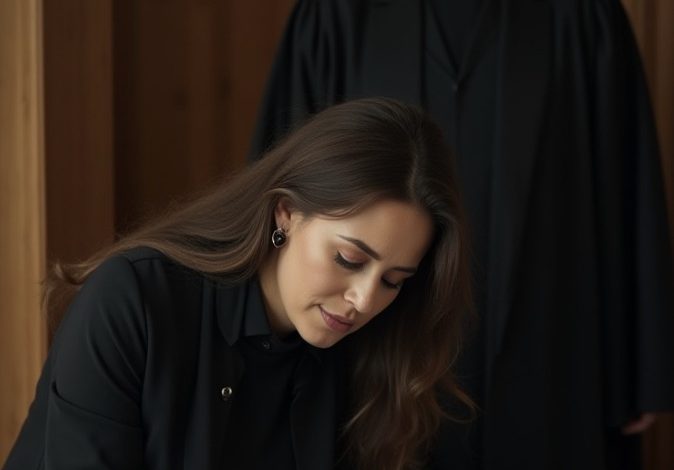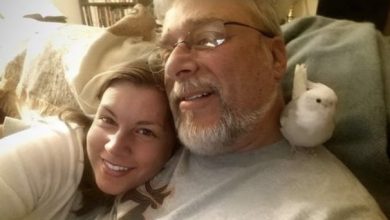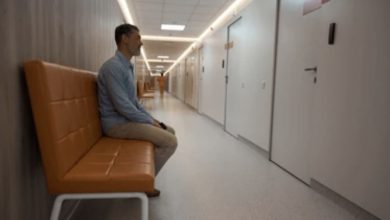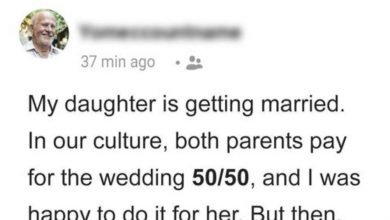“At My Husband’s Funeral, the Priest Noticed His Hand—Moments Later, the Church Doors Were Locked and the Truth Unfolded”

After the funeral ceremony, the priest came to me quietly. His face had lost all color, and his hands were shaking as he asked in a trembling voice, “Are you the wife of the deceased?”
I nodded, not understanding why he looked so frightened.
He leaned closer and whispered, “Call the police. Right now. And don’t let anyone leave the church.”
My blood ran cold. “Why? What’s wrong?” I asked, my voice cracking.
He took a deep breath and said, “Look at his right hand… under the sleeve.”
My heart thudded painfully. Slowly, I lifted the cuff of my husband’s sleeve with trembling fingers. What I saw made me gasp. On his wrist were four fresh needle marks, deep and dark, surrounded by purple bruises. They looked like small, cruel eyes staring at me from his pale skin. Those marks hadn’t been there three days ago when I prepared his clothes for the funeral.
Father Michael’s voice was low but steady. He explained that he had noticed the strange marks only moments earlier, while arranging Samuel’s hands for the final blessing. My mind spun. Around me, the church was full of whispers and quiet sobs, but all I could hear was the rush of blood in my ears.
I turned my head, scanning the people standing in the pews — family, friends, co-workers. Everyone looked sorrowful, confused. Then my eyes met Victor’s. He was an old family friend, someone Samuel had trusted for years. But now his face had gone ashen. His lips trembled, and his eyes darted from side to side as if searching for a way out.
Victor began moving slowly toward the door, trying not to draw attention, but Father Michael noticed. The priest gave a subtle nod to the deacon, who quickly stepped toward the entrance and slid the heavy bolt into place. The loud metallic sound echoed through the small church like a final judgment.
A tense silence fell. People looked around uneasily, not sure what was happening. I felt dizzy, my knees weak. My mind went back to the day Samuel died. Three days earlier, I had received a call from Victor. His voice had been calm but serious. He said Samuel had suddenly fallen ill and I should come home immediately.
I had rushed home, terrified. When I entered the apartment, Samuel was lying motionless on the bed. Victor stood beside him, phone in hand, explaining to the emergency operator that Samuel might have had a heart attack. The paramedics arrived quickly but could do nothing. They said it was a natural death — an older man with a heart condition, no signs of foul play.
But now those fresh needle marks told another story — one that chilled me to the bone.
Father Michael asked everyone to stay seated until the police came. His calm authority made it clear that no one should argue. Victor mumbled something about an urgent business meeting, but the deacon shook his head and blocked the door.
The police arrived within minutes — two officers in dark uniforms. Their faces were serious as they looked around the room filled with frightened mourners. One of them, a tall man who introduced himself as Lieutenant Peterson, listened carefully as the priest explained what had happened. Then he began checking everyone’s identification.
When it was Victor’s turn, he reached into his jacket pocket for his wallet. A small object fell to the floor with a sharp clatter. The younger officer bent down and picked it up — a disposable syringe. Inside Victor’s pocket, they also found a small glass vial containing a clear liquid.
Victor’s face turned bright red. He stammered that it was his insulin, claiming he was diabetic. But his words sounded weak and unconvincing. Lieutenant Peterson examined the syringe and vial, his expression hardening. He called in a request for a detective team. The atmosphere in the church shifted from confusion to horror.
About thirty minutes later, Detective Carter arrived — a middle-aged man with gray at his temples and tired, watchful eyes. He listened to Father Michael’s account, inspected Samuel’s wrist, and ordered everyone to be taken to the station for questioning.
Victor was handcuffed and led out of the church. As he passed me, he looked straight into my eyes. What I saw there made me shiver — not guilt, not regret, but something twisted, a dark obsession that sent chills down my spine.
At the police station, Detective Carter spoke to me gently but directly. He said that the liquid found in Victor’s pocket contained potassium chloride — a substance that, when injected in large doses, could stop the heart instantly and leave almost no trace during a routine autopsy.
I listened in disbelief. Carter explained that in medicine, potassium chloride is sometimes used properly under supervision, but in the wrong hands, it becomes a perfect weapon. If the victim already had heart problems, their death would appear natural. The injection marks could stay hidden until days later.
He told me Samuel’s body would need to be exhumed for a more detailed examination. Victor would remain in custody for now, and I would have to describe in detail everything about Samuel’s last days.
When I left the station, I felt hollow — like someone had scraped out my insides. The man I had trusted, the friend who had helped us so often, had likely murdered my husband. And the most painful part was that I had no idea why.
A week later, Dr. Evans, the medical examiner, called me to his office. He was an older man with kind eyes behind his glasses. His desk was covered in files and medical photos. He asked me to sit and began to explain the results of Samuel’s re-examination.
The truth was worse than I could ever have imagined. The photos showed multiple injection points on Samuel’s body. Dr. Evans said the poisoning had taken place slowly, over two weeks. Victor had injected Samuel several times with small doses before giving the final, lethal one.
At first, Samuel would have only felt tired or sore — symptoms he had already associated with his illness. Then, as the doses increased, his body would have weakened until his heart finally stopped.
Tears blurred my vision as the doctor spoke. Victor hadn’t just killed Samuel — he had tortured him quietly, pretending to be a caring friend. Each visit had been part of a slow, planned murder.
A few days later, Detective Carter called me back to the station. They had searched Victor’s apartment. On his desk, they found a thick leather notebook filled with his handwriting. It wasn’t a diary of feelings but a record of his crime — notes about dosage, times, and Samuel’s reactions. Even more disturbing were pages describing how Victor enjoyed gaining Samuel’s trust and imagined comforting me after my husband’s death.
The most horrifying discovery was a collection of secret photos of me. There were dozens — me leaving home, at the grocery store, at work, even through our apartment window. On the back of each photo, Victor had written little notes about my clothes, my mood, who I talked to.
Detective Carter explained that Victor had been obsessed with me for years. I thought back to moments when I had felt watched but dismissed the feeling. Now everything made sense.
The next shock came when my mother-in-law called, sobbing. She said the family lawyer had told her something terrible — a week before Samuel’s death, Victor had convinced him to change his will. He claimed it was to “protect me,” but the new will gave Victor half of the estate. Samuel, weak and confused, had signed it, thinking he was doing something good for me.
I was shaking with anger. Victor hadn’t only murdered my husband — he had robbed him, too. His greed and twisted feelings had turned into pure evil.
When the case reached court, Victor’s lawyer, Mr. Sommers, fought viciously. He said the syringe was planted, the diary was just part of a detective novel Victor had been writing, and the photos of me were “research for a character.” He even claimed that Samuel’s will had been changed out of gratitude, not manipulation.
The defense also brought in a medical expert who argued that potassium chloride could have been given during Samuel’s medical treatments. He said the injection marks might have come from regular IVs. Without proof that Victor had given the final injection, it would be hard to prove murder.
I left the courtroom that day in despair. The prosecutor warned me that Victor might only be convicted of negligent homicide — meaning he could walk free in a year or two. I couldn’t bear the thought.
That night, sitting alone in our empty apartment, I made a decision. I would not give up. If the police couldn’t find more evidence, I would.
I started by visiting our neighbors. Mrs. Gable, an elderly woman who lived next door, thought for a moment and then recalled something odd. The day before Samuel’s death, she had seen Victor carrying a small bag to the dumpsters behind the building. He had looked around nervously before dropping it in. Inside, she thought she saw something white, maybe gloves or bandages.
It might have been nothing, but to me it was a clue. I told Detective Carter, but he said the garbage had been collected long ago. The lead was gone.
Then I remembered Samuel’s phone, which the police had returned to me. I took it to a specialist to recover deleted messages. After several days, he managed to restore a series of texts between Samuel and Victor. In them, Victor had pushed Samuel to try a “new medicine” from a private doctor he knew. He kept insisting that it would help his heart. Samuel hesitated, but Victor finally convinced him. The last message read: “I have the first dose ready. We’ll start tomorrow.”
When the police saw the recovered texts, they scheduled another interrogation. During questioning, Victor’s lawyer tried to claim it was just friendly advice. But when Detective Carter read the final message out loud, Victor broke down.
His face twisted, his hands shook, and suddenly he began to confess. He said he had loved me for years. He claimed that seeing me suffer beside a sick husband had driven him mad — that he wanted to “free” me from pain. He insisted that Samuel was doomed anyway, that his death had been a “mercy.” His words were sick and delusional, but they were enough to strengthen the case.
Still, the prosecutor warned that proving premeditated murder would be difficult. Victor was charged only with negligent homicide — a lesser crime. I felt crushed.
But then something miraculous happened. A nurse named Helen Miller called me late one night. Her voice was nervous as she said she worked at the local clinic where Samuel had received treatment. She explained that she had noticed strange records in the medication logbook — potassium chloride had been signed out several times under Samuel’s name, but the signature wasn’t his. She had kept copies of the pages, and she offered to give them to me.
The next morning, she handed me the documents. The signature was clearly Victor’s. He had been collecting the substance for months, pretending it was for Samuel.
When Detective Carter saw the papers, he looked stunned. This was the proof we needed. At the same time, the phone specialist discovered Victor’s hidden browser history — searches about potassium chloride poisoning and even encrypted messages with an illegal pharmacist discussing how to inject it without leaving marks.
One of the messages said, “I’ll free her soon. She deserves better than a dying man.”
When the trial resumed, the prosecutor presented all this new evidence. Piece by piece, he built the full picture of Victor’s plan — his obsession, his greed, his crime. The defense could no longer deny it.
During his final statement, Victor stood and faced me. His voice shook as he said he had only acted out of love, that he couldn’t bear to see me suffer. He claimed that I would one day forgive him. I stared back at him, feeling nothing but disgust. What he called love was just selfish madness.
The jury deliberated for hours. When they returned, the foreman spoke clearly: “Guilty on all counts.”
A week later, the judge pronounced the sentence — eighteen years in a maximum-security prison, with no chance of parole. Victor screamed that he was misunderstood, but the guards silenced him quickly.
As I watched him taken away, I finally felt peace. Justice had been served.
The court also declared the fake will invalid and restored all of Samuel’s estate. Victor’s own property was seized to pay for the damages.
A week later, I returned to the same church. Father Michael held a memorial service for Samuel — this time free from suspicion or lies. Surrounded by friends, I allowed myself to cry for the first time in months.
A year later, I sold our home and used the money to start a charitable foundation in Samuel’s name — to help seriously ill people who needed care and kindness. Turning my pain into something good gave me purpose again.
Victor’s letters from prison went unanswered. He never truly understood the horror of what he had done.
On the anniversary of Samuel’s death, I stood on stage at a charity event surrounded by people his memory had inspired to help. For the first time, I felt that light had finally broken through the darkness. The tragedy that had almost destroyed me had become something that could heal others. And in that moment, I knew Samuel would have been proud.










